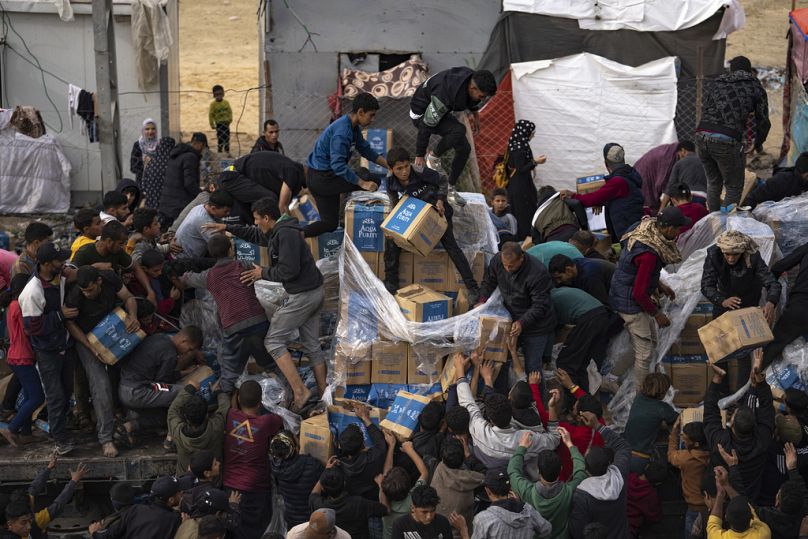Human Rights Watch accuses Israel of war crimes, alleging the use of starvation as a method of warfare in Gaza, obstructing essential resources, and urging international intervention to address the deepening humanitarian crisis.
A report by human rights organisation, Human Rights Watch, has accused the Israeli government of committing war crimes by allegedly resorting to starvation as a method of warfare in the occupied Gaza Strip.
 ADVERTISEMENT
ADVERTISEMENT
 ADVERTISEMENT
ADVERTISEMENT
The organisation alleges that Israeli forces are obstructing the delivery of essential resources, including water, food, and fuel, and hindering humanitarian assistance, exacerbating the already dire conditions in the region.
'Intent to starve civilians'
Since the October 7, 2023, attack by Hamas-led fighters on Israel, high-ranking Israeli officials, including Defense Minister Yoav Gallant, National Security Minister Itamar Ben-Gvir, and Energy Minister Israel Katz, have openly expressed their intent to deprive Gazan civilians of basic necessities.
Human Rights Watch claims that this policy is being implemented by Israeli forces, constituting a violation of international humanitarian law.
Omar Shakir, Director for Israel and Palestine at Human Rights Watch, stated, "For over two months, Israel has been depriving Gaza's population of food and water, a policy spurred on or endorsed by high-ranking Israeli officials and reflecting an intent to starve civilians as a method of warfare."
Human Rights Watch conducted interviews with 11 displaced Palestinians between November 24 and December 4, revealing the profound hardships faced by Gazans in securing basic necessities. One interviewee lamented, "We had no food, no electricity, no internet, nothing at all."
In southern Gaza, individuals described the scarcity of potable water, empty shops, long lines for food, and soaring prices.
The United Nations World Food Programme (WFP) reported on December 6 that 9 out of 10 households in northern Gaza and 2 out of 3 households in southern Gaza had experienced at least one full day and night without food.
“Human Rights Watch … did not condemn the attack on Israeli citizens and the massacre of October 7 and has no moral basis to talk about what’s going on in Gaza if they turn a blind eye to the suffering and the human rights of Israelis,” foreign ministry spokesman Lior Haiat told AFP.
The Israeli governmental aid organisation Coordination of Government Activities in the Territories reported that 201 humanitarian aid trucks were inspected and transferred toward the Gaza Strip on December 17th.
The Israeli government did not respond when contacted by Euronews.
Against international law
International humanitarian law, specifically the Rome Statute of the International Criminal Court, prohibits the starvation of civilians as a method of warfare. Deliberately depriving civilians of objects indispensable to their survival is considered a war crime.
In addition to the alleged starvation tactics, Human Rights Watch condemns Israel's ongoing blockade of Gaza, lasting for over 16 years, as collective punishment, also deemed a war crime.
As the occupying power in Gaza, Israel is obligated under the Fourth Geneva Convention to ensure the civilian population's access to food and medical supplies.
The WFP warned of the "immediate possibility" of starvation on November 17, emphasising the near non-existence of food and water supplies. Subsequent reports indicated a "high risk of famine" and severe hunger levels in Gaza.
The Norwegian Refugee Council highlighted "catastrophic water, sanitation, and hygiene needs" on November 3.
The report detailed the shutdown of wastewater and desalination facilities, exacerbating the already critical water situation in Gaza. Even before the recent hostilities, Gaza faced a severe lack of potable water, with 1.2 million of its 2.2 million people estimated to be facing acute food insecurity.
Israel's military actions, including extensive airstrikes and the destruction of vital infrastructure, have further compounded the humanitarian crisis.
The ongoing bombardment has damaged or destroyed bakeries, grain mills, agriculture, water and sanitation facilities, and road networks, making aid delivery challenging.
HRW urges suspension of military assistance to Israel
Human Rights Watch calls for an immediate cessation of the alleged use of starvation as a weapon of war by the Israeli government.
The organisation urges Israel to comply with international law, lift the blockade on Gaza, and ensure the delivery of essential resources, including water, electricity, medical aid, and food.
The international community is implored to respond urgently to the deepening humanitarian catastrophe in Gaza, with Human Rights Watch suggesting concerned governments, including the United States, the United Kingdom, Canada, and Germany, suspend military assistance and arms sales to Israel as long as alleged abuses continue with impunity.
"The Israeli government is compounding its collective punishment of Palestinian civilians and the blocking of humanitarian aid by its alleged use of starvation as a weapon of war," said Omar Shakir. "The deepening humanitarian catastrophe in Gaza calls for an urgent and effective response from the international community."











